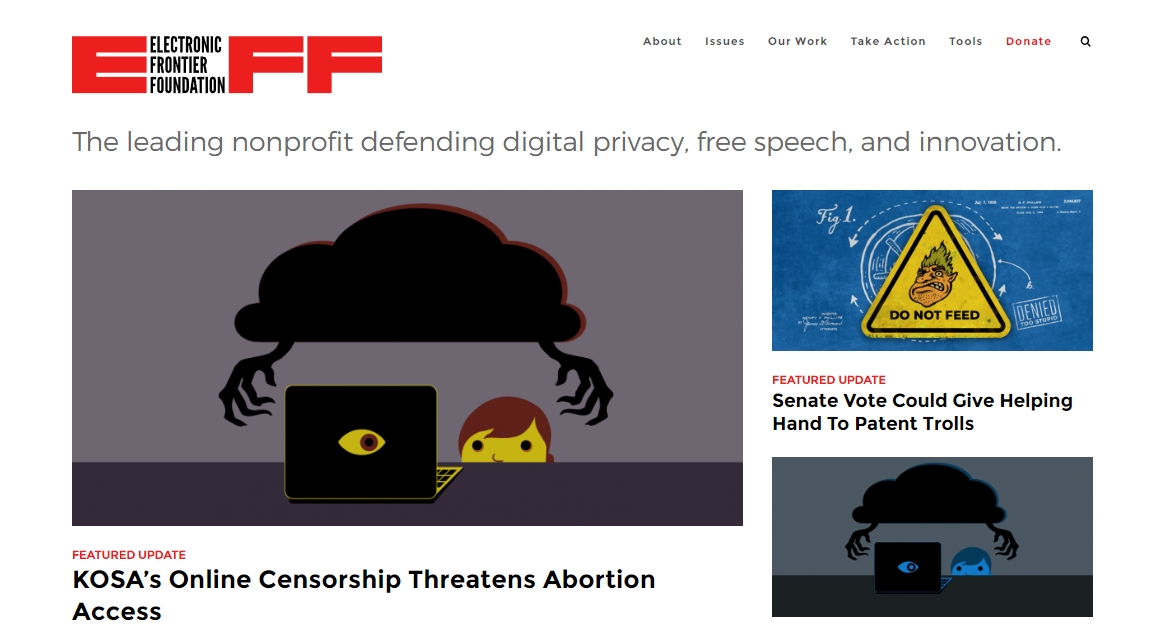and the distribution of digital products.
DM Television
Cypherpunks Write Code: Eva Galperin Against Stalkerware
\ Cypherpunks are advocates for privacy who develop and use open cryptographic tools to resist surveillance and censorship globally. Not all of them participated in the first mailing lists in the 90s, but they’re still very much partaking in the same fight, with the same ideals. Eva Galperin, who has been a strong advocate for privacy and freedom of speech online, can be considered one of them.
\ She was born in Latvia to Jewish parents, which was not exactly good news before 1990. Latvia belonged to the Union of Soviet Socialist Republics (USSR) back then, and the state itself practiced antisemitism. Galperin’s family sought political asylum in the US when Jewish people were allowed to freely emigrate, so they relocated to San Francisco, California, around 1980.
\ Her interest in computers began early, inspired by her father, a computer security specialist. At just 12 years old, she received a custom Unix/Solaris desktop and quickly became involved in online communities, discussing science fiction and playing interactive text games. Her cypherpunk-related ideologies would come much later.
\ As she grew older, Galperin balanced her technical interests with academic pursuits. She studied political science and international relations at San Francisco State University while working for several companies as a Unix system administrator in Silicon Valley. Before joining the Electronic Frontier Foundation (EFF) in 2007, Galperin also worked at the Center for US-China Policy Institute. There, she organized conferences and researched Chinese energy policy.
\
At the Electronic Frontier Foundation (EFF)The Electronic Frontier Foundation (EFF) is a renowned international non-profit dedicated to digital rights, which was founded in 1990 by another cypherpunk, John Gilmore. It tackles a wide range of issues, from fighting government surveillance and defending encryption to advocating for net neutrality and battling against corporate overreach. Through legal action, policy work, and education, the EFF ensures that the rights of individuals are respected in an increasingly digital world.
\
\ Galperin has been working for the EFF since 2007, taking on different roles. As she described, she started taking calls from people looking for the legal assistance the EFF provides, but she eventually moved to the activism team. In 2013, she was their International Freedom of Expression Coordinator.
\ By 2015, she launched a whole campaign with Jillian York (current EFF's Director for International Freedom of Expression) to raise awareness about the risks of enforcing real names online, especially for journalists, activists, and individuals in authoritarian regimes who rely on anonymity to stay safe. This has been a common point in all of her career: cybersecurity education and help for vulnerable people. As she called them, ‘those who aren’t in the room’.
\
“The kind of security work I am passionate about starts with the people that I want to protect. It starts with thinking about who is left out of the conversation or who’s not in the room. I also get to use my technical skills, reverse malware, demonstrate harm, or eventually yell at a company but I always start with the people.”
\ She was promoted to Director of Cybersecurity in 2017 and leads the EFF’s Threat Lab since 2019. This group investigates how surveillance technologies target vulnerable communities and individuals. It examines issues like state-sponsored malware, stalkerware, and privacy risks from police data collection, aiming to protect privacy rights.
\
Coalition Against StalkerwareIt’s truly alarming how many people would want to spy on their ‘loved ones’ as a form of abusive control, especially in the case of couples. The so-called stalkerware was created exactly for that. This is malicious software designed to secretly monitor and track a person’s activities on their phone or other devices without their knowledge. It’s often used by abusive partners or individuals to spy on victims, accessing private information like messages, calls, location, and browsing history. Typically installed without consent and hidden, it can lead to further harassment or physical abuse.
https://youtu.be/zLtfoCw16Z0?feature=shared&embedable=true
\ By April 2019, Galperin managed to convince the cybersecurity company Kaspersky Lab to include stalkerware as a detectable threat in their antivirus products for Android. She also asked Apple to do the same in the App Store for iOS, and even called for the authorities to ban this kind of software and close the companies that produce it. As she said, “It would be nice to see some of these companies shut down. It would be nice to see some people go to jail."
\ Galperin didn’t stop there, though. In November 2019, she co-founded the Coalition Against Stalkerware, supported by several cybersecurity entities and anti-violence organizations. They offer training, technical guidance, and educational resources for victims, advocacy organizations, and security professionals. Additionally, the Coalition works to improve the detection and prevention of stalkerware by setting best practices and enhancing the capacity of support services.
\ Partly thanks to this awareness effort, the US Federal Trade Commission started to pay more attention to stalkerware as a real threat to victims. They banned the spyware maker Support King in 2021 and considered applying criminal sanctions for this type of company and its executives. Galperin considered it a major victory for the cause.
\
Privacy is on us tooThere are people like Eva Galperin fighting against censorship and surveillance worldwide, creating and providing digital resources for us to preserve our privacy and online freedom. Although, as she’s also commented, the fight should start with ourselves.
\
“I think the growth of the digital rights ‘scene’ is amazing. We’re not alone in this fight — there are so many allies in every corner of the globe…but that also means we have to be strident in standing up for ALL of our rights, and not compromise.”
\
By using the digital resources available to protect our online privacy, we can take control of our personal data and safeguard our freedom. This can be as simple as adopting encrypted communication, using VPNs, or exploring decentralized platforms. These tools help you resist unwanted tracking and censorship, ensuring that your voice and activities remain private and secure.
\ One powerful tool in this space is Obyte, a decentralized platform built on a Directed Acyclic Graph (DAG) structure. Unlike blockchains, Obyte offers a censorship-resistant crypto ecosystem where users can move funds and store data safely, without middlemen or restrictions. Its design offers secure transactions in a fully decentralized network, providing an open space for anyone to participate. Besides, developers using Obyte to build new apps can contribute to a more private, secure, and free digital environment.
\
:::tip Read more from Cypherpunks Write Code series:
- Tim May & Crypto-anarchism
- Wei Dai & B-money
- Nick Szabo & Smart Contracts
- Adam Back & Hashcash
- Eric Hughes & Remailer
- St Jude & Community Memory
- Julian Assange & Wikileaks
- Hal Finney & RPOW
- John Gilmore & EFF
- Satoshi Nakamoto & Bitcoin
- Gregory Maxwell & Bitcoin Core
- Vinay Gupta & Mattereum
- David Chaum & Ecash
- Bram Cohen & BitTorrent
- David D. Friedman & Machinery of Freedom
- Tornado Cash Founders
- Len Sassaman & Remailers
- Peter Todd & Bitcoin Core
:::
\
:::info Featured Vector Image by Garry Killian / Freepik
Photograph of Eva Galperin by EFF
:::
\n
- Home
- About Us
- Write For Us / Submit Content
- Advertising And Affiliates
- Feeds And Syndication
- Contact Us
- Login
- Privacy
All Rights Reserved. Copyright , Central Coast Communications, Inc.

